
Sandwich is a town and civil parish in the Dover District of Kent, south-east England. It lies on the River Stour and has a population of 4,985. Sandwich was one of the Cinque Ports and still has many original medieval buildings, including several listed public houses and gates in the old town walls, churches, almshouses and the White Mill. While once a major port, it is now two miles from the sea due to the disappearance of the Wantsum Channel. Its historic centre has been preserved. Sandwich Bay is home to nature reserves and two world-class golf courses, Royal St George's and Prince's. The town is also home to many educational and cultural events. Sandwich also gave its name to the food by way of John Montagu, 4th Earl of Sandwich, and the word sandwich is now found in several languages.
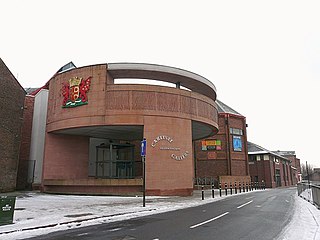
Tullie House Museum and Art Gallery is a museum in Carlisle, England. Opened by the Carlisle Corporation in 1893, the original building is a converted Jacobean mansion, with extensions added when it was converted. At first the building contained the museum and also a library, an art school and a technical school.
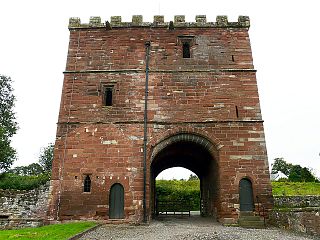
Wetheral Priory Gatehouse is a 15th-century stone fortification in Wetheral, Cumbria. The priory was founded at the start of the 12th century and the gatehouse controlled the entrance to its outer courtyard. When the priory was dissolved in 1538 the gatehouse and a nearby stretch of wall were the only parts to survive. The gatehouse passed into the control of Carlisle Cathedral and became the local vicarage during the 16th and 17th centuries, before being used to store hay. Now part of a modern farm that occupies the former priory site, it is controlled by English Heritage and open to visitors. The crenellated gatehouse has three storeys, with the main entrance and porters' lodge on the ground floor and two domestic chambers on the upper floors. English Heritage considers the building to be "the finest medieval gatehouse in Cumbria".
The Headstone Museum, also known as the Harrow Museum, is the local history museum for the London Borough of Harrow in England.

Clayton Hall is a 15th-century manor house on Ashton New Road, in Clayton, Manchester, England. It is hidden behind trees in a small park. The hall is a Grade II* listed building, the mound on which it is built is a scheduled ancient monument, and a rare example of a medieval moated site. The hall is surrounded by a moat, making an island 66 m by 74 m. Alterations were made to the hall in the 16th and 17th centuries, and it was enlarged in the 18th century.
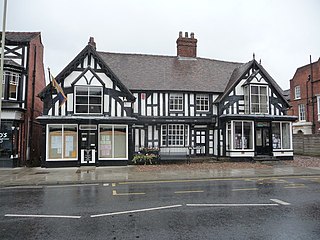
Newport Guildhall is a large timber-framed municipal building in Newport, Shropshire, England. It is a Grade II* listed building.

The Old Punch Bowl is a medieval timber-framed Wealden hall-house on the High Street in Crawley, a town and borough in West Sussex, England. Built in the early 15th century, it was used as a farmhouse by about 1600, passing through various owners and sometimes being used for other purposes. Since 1929 it has been in commercial use—firstly as a tearoom, then as a bank, and since 1994 as a public house. When built, it was one of at least five similar hall-houses in the ancient parish of Crawley; it is now one of the oldest and best-preserved buildings in Crawley town centre.
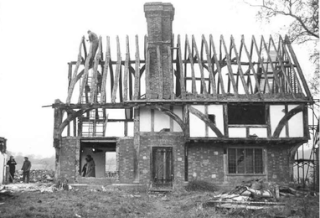
The Wealden hall house is a type of vernacular medieval timber-framed hall house traditional in the south east of England. Typically built for a yeoman, it is most common in Kent and the east of Sussex but has also been built elsewhere. Kent has one of the highest concentrations of such surviving medieval timber-framed buildings in Europe.

All Saints' Church is in the village of Boltongate, Cumbria, England. It is an active Anglican parish church in the deanery of Solway, the archdeaconry of West Cumberland and the diocese of Carlisle. A former fortified church, it is recorded in the National Heritage List for England as a designated Grade I listed building.

St Bridget's Church is in the village of Brigham, Cumbria, England. It is an active Anglican parish church in the deanery of Solway, the archdeaconry of West Cumberland, and the diocese of Carlisle. The church is recorded in the National Heritage List for England as a designated Grade I listed building.

St Kentigern's Church,, is in the village of Caldbeck, Cumbria, England. It is an active Anglican parish church in the deanery of Carlisle, the archdeaconry of Carlisle and the diocese of Carlisle. The church is recorded in the National Heritage List for England as a designated Grade I listed building. It is dedicated to Saint Kentigern, whose alternative name is Saint Mungo; hence the church's alternative title of Caldbeck, St Mungo.

St John the Evangelist's Church is in the village of Newton Arlosh, Cumbria, England. It is an active Anglican parish church in the deanery of Carlisle, the archdeaconry of Carlisle, and the diocese of Carlisle. It was built as a fortified church, one of a number of such buildings near the Scottish border. It was restored and extended in the 19th century. The church is recorded in the National Heritage List for England as a designated Grade I listed building.

St Martin's Church is in Front Street, Brampton, Cumbria, England. It is an active Anglican parish church in the deanery of Brampton, the archdeaconry of Carlisle and the diocese of Carlisle. It is recorded in the National Heritage List for England as a designated Grade I listed building and is the only church designed by the Pre-Raphaelite architect Philip Webb. The architectural historian Nikolaus Pevsner described it as "a very remarkable building".
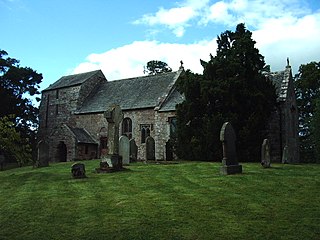
St James' Church is in the village of Great Ormside, Cumbria, England. It is an active Anglican parish church in the deanery of Appleby, the archdeaconry of Carlisle, and the diocese of Carlisle. The parish is united with nine other parishes and thirteen places of worship to form the Heart of Eden benefice. The church is recorded in the National Heritage List for England as a designated Grade I listed building. It stands on top of a circular mound overlooking the River Eden.

The hall house is a type of vernacular house traditional in many parts of England, Wales, Ireland and lowland Scotland, as well as northern Europe, during the Middle Ages, centring on a hall. Usually timber-framed, some high status examples were built in stone.

The Market Building in Penzance is a Grade I listed building situated at the top of Market Jew Street, Penzance.
Brackenhill Tower is a peel tower, in the parish of Arthuret, in Cumbria, just north of the River Lyne. The site is about 2 miles (3.2 km) north of Kirklinton and 4 miles (6.4 km) east of Longtown, or 10 miles (16 km) north of Carlisle and 8 miles (13 km) east of Gretna Green, and is a good defensive position, with ravines to the north and south. Extensions were added in the 18th and 19th centuries, but the original tower has had little alteration. It is the only remaining example of a Scottish tower house south of the border with England, and became a grade II* listed building in 1957.

Bury St Edmunds Guildhall is a municipal building in the Guildhall Street, Bury St Edmunds, Suffolk. It is a Grade I listed building.

Carlisle Tithe Barn is an historic building in Carlisle, Cumbria. It is a Grade I listed building, listed on 1 June 1949.
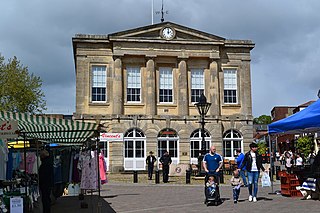
Andover Guildhall is a municipal building in the High Street, Andover, Hampshire, England. The guildhall, which was the headquarters of Andover Borough Council, is a Grade II* listed building.



















